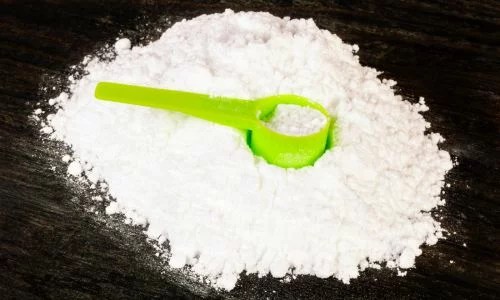Creatine: a term that resonates through the corridors of gyms, echoes in the discussions among health enthusiasts, and frequently appears in the lexicon of the fitness community. At Super Achiever Club, the nexus of self-improvement, we understand the importance of demystifying this popular supplement. Our mission is to impart knowledge that empowers free-thinking humans to become super achievers, enhancing their journey in health, wealth, and social dynamics.
Contents
Creatine, more than just a buzzword, is a cornerstone in the realm of health supplements. Its popularity isn’t unfounded; the substance has been extensively studied and celebrated for its myriad benefits, particularly in the contexts of physical performance and cognitive enhancement.
In this comprehensive guide, we’ll delve deep into the world of creatine. Our goal? To unravel the intricate tapestry of its benefits, understand its role in health and fitness, and address the often-asked question: What is creatine, really? From the molecular to the monumental, we’ll explore how this natural compound, often misunderstood, can be a game-changer in your personal health regime.
In the pursuit of excellence, knowledge is your most powerful tool. Join us as we embark on this enlightening journey, scrutinizing every detail about creatine. Whether you’re a seasoned athlete, a fitness newbie, or simply a curious mind, this exploration is tailored for you.
Stay tuned, as we uncover the truth behind the myths, and present to you the world of creatine in its full, unadulterated glory.
What is Creatine?
Definition and Basic Understanding
Creatine is more than just a supplement; it is a naturally occurring compound found in our muscle cells. It plays a critical role in energy production, especially during high-intensity, short-duration exercises like sprinting or heavy lifting.
- Chemical Composition: Creatine is composed of three amino acids: arginine, glycine, and methionine.
- Primary Function: Its main function is to increase the body’s ability to produce energy rapidly. With more energy, one can train harder and more effectively, leading to faster muscle growth and improved exercise performance.
- Natural Sources: While it is popularly taken as a supplement, creatine is also found in some foods like red meat and fish.
For a deeper understanding of its biochemical role, one can explore how creatine works in the human body.
Historical Context and Evolution of Creatine Use
Creatine’s journey from a scientific curiosity to a staple in the fitness world is as fascinating as its benefits.
- Early Discoveries: The existence of creatine was first recognized in the early 19th century, with scientists identifying it as a component of skeletal muscle.
- Growing Popularity: Its popularity in the athletic community surged in the 1990s, following the 1992 Olympics, where it was reportedly used by some medalists.
- Research and Development: Since then, extensive research has been conducted, solidifying its reputation as a safe and effective supplement for enhancing athletic performance.
Creatine Today: A Pillar in Fitness
Today, creatine stands tall as a highly researched and widely used supplement. Its evolution reflects a journey driven by scientific inquiry and practical application.
- Forms and Variants: From creatine monohydrate, the most researched form, to newer variants like creatine HCL and micronized creatine, the supplement has diversified to meet varying needs.
- Widespread Use: Its use extends beyond professional athletes; it’s embraced by fitness enthusiasts, bodybuilders, and individuals seeking cognitive and physical enhancement.
The Science Behind Creatine

Understanding How Creatine Works in the Body
Creatine’s role in the body is both intricate and impactful. It’s a key player in the production and management of energy, particularly in muscle cells.
- Energy Production: Creatine’s primary function is to increase the creation of adenosine triphosphate (ATP), the body’s energy currency. During high-intensity activities, ATP is broken down to release energy. Creatine, stored as creatine phosphate in muscle cells, donates a phosphate group to help replenish ATP, thus maintaining energy availability.
- Enhanced Performance: This mechanism explains the effectiveness of creatine in improving strength, endurance, and recovery during short, intense bouts of exercise.
Creatine Synthesis and Natural Sources
Our bodies synthesize creatine naturally, but understanding its synthesis and natural sources can offer insights into why supplementation might be necessary for some.
- Synthesis Process: Creatine is synthesized in the liver and kidneys from the amino acids glycine, arginine, and methionine. This endogenous production contributes to about half of the daily creatine requirement.
- Dietary Sources: The rest is obtained from dietary sources, mainly meat and fish. This is why vegetarians and vegans might have lower creatine stores and could benefit more from supplementation.
Creatine’s Effectiveness: Beyond Muscle Power
The effectiveness of creatine extends beyond muscle strength and exercise performance. It’s also been linked to other health benefits, such as cognitive enhancement and potential neuroprotective properties.
- Cognitive Benefits: Studies suggest that creatine supplementation can improve memory and processing speed, especially in situations of sleep deprivation or mental fatigue.
- Neuroprotective Effects: There’s emerging evidence pointing towards creatine’s role in neuroprotection, possibly aiding in the prevention of neurodegenerative diseases.
Benefits of Creatine
Muscle Growth and Strength Enhancement
Creatine is synonymous with muscle growth and strength, and for good reason.
- Mechanism: It enhances the body’s capacity to produce ATP, the primary energy currency, especially during high-intensity exercises. This increased energy availability allows for more intense training sessions, which in turn stimulates muscle growth.
- Evidence: Numerous studies validate the effectiveness of creatine in increasing muscle mass and strength, making it a go-to supplement for bodybuilders and athletes.
- Further Reading: For a deeper insight into how creatine aids muscle growth, explore the benefits of creatine for muscle growth.
Enhanced Recovery
Creatine isn’t just about boosting performance; it’s also about recovery.
- Reduction in Muscle Damage: Supplementation has been shown to reduce muscle cell damage and inflammation following exhaustive exercise.
- Improved Recovery: This leads to a quicker recovery process, enabling athletes to train more effectively and frequently.
- Supporting Research: Studies highlight creatine’s role in reducing muscle cramps and dehydration during endurance activities.
Cognitive Benefits
Creatine’s benefits extend beyond physical prowess, impacting cognitive function as well.
- Memory and Processing: Research suggests improvements in short-term memory and reasoning skills with creatine supplementation.
- Stress and Fatigue: It may also offer benefits under conditions of sleep deprivation or mental fatigue.
- Relevance: These effects are particularly relevant for individuals engaged in cognitively demanding tasks.
Support for Older Adults

The elderly can also reap significant benefits from creatine.
- Muscle Preservation: It aids in the preservation of muscle mass and strength, which are crucial for maintaining mobility and reducing the risk of falls.
- Cognitive Health: There’s potential for creatine to support cognitive health in aging populations.
Enhanced Performance in High-Intensity Sports
Creatine is a staple in the regimen of athletes involved in high-intensity sports.
- Quick Energy Boost: Its role in ATP regeneration is crucial for sports that require short bursts of intense effort.
- Endurance and Power: Athletes in sports like sprinting, football, and weightlifting often use creatine to enhance their power and endurance.
Creatine Monohydrate: A Closer Look
The Preeminence of Creatine Monohydrate
Creatine monohydrate stands out for its extensive research backing and proven efficacy.
- High Purity and Effectiveness: It’s known for its high purity level, which contributes to its effectiveness. The body can absorb and utilize creatine monohydrate efficiently, making it a reliable choice.
- Scientific Backing: A wealth of research supports its benefits in enhancing strength, increasing muscle mass, and improving exercise performance.
- Popularity and Accessibility: Its popularity also means it’s widely available and often more affordable than other forms. For a comprehensive look at the best options, visit best creatine monohydrate supplements.

Comparative Analysis with Other Forms of Creatine
While creatine monohydrate is the most studied, other forms like creatine hydrochloride (HCL) and micronized creatine also have their unique advantages.
- Creatine HCL: This form is claimed to be more soluble in water, which some suggest could lead to better absorption and less stomach discomfort. For a deeper understanding, see creatine HCL vs monohydrate.
- Micronized Creatine: It is creatine monohydrate that has been micronized (finely ground). This increases its surface area, potentially improving solubility and absorption.
- Other Variants: There are also other less common forms like creatine ethyl ester and liquid creatine, each with its unique properties and claims.
Why Creatine Monohydrate is Often the Preferred Choice
Despite the variety of options, creatine monohydrate remains the preferred choice for many, due to several reasons.
- Proven Track Record: Its long history of use in the athletic and bodybuilding communities has established its reputation as a reliable and effective supplement.
- Extensive Research: The bulk of scientific studies on creatine’s benefits have used creatine monohydrate, making its effects well-documented and trusted.
- Cost-Effectiveness: Generally, creatine monohydrate is more cost-effective compared to other forms, providing an affordable option for long-term supplementation.
Real-world Effectiveness of Creatine
Analyzing Studies and Research Findings
Creatine’s effectiveness is not just theoretical; it’s backed by robust scientific evidence.
- Performance Enhancement: Multiple studies have consistently shown that creatine supplementation can lead to significant improvements in strength, power, and muscle mass.
- Versatility Across Activities: Its benefits are not limited to weightlifting and bodybuilding. Research indicates effectiveness in a range of sports, from sprinting to soccer.
- Long-Term Benefits: Longitudinal studies suggest that consistent creatine use can contribute to sustained improvements in athletic performance.
Real-World Testimonials and Case Studies
Beyond the laboratory, creatine’s real-world impact is evident through numerous testimonials and case studies.

- Athletes’ Experiences: Many professional athletes credit creatine for enhancing their training results and competitive performance. For insights into how athletes incorporate creatine, visit creatine for athletes.
- Everyday Users: Fitness enthusiasts and gym-goers often report noticeable improvements in their workouts and recovery times after starting creatine supplementation.
- Case Studies: Specific case studies, like those of competitive powerlifters or track athletes, provide tangible examples of creatine’s role in achieving personal bests and breaking records.
Creatine Effectiveness Across User Groups
Creatine’s real-world effectiveness spans various demographics, from elite athletes to everyday fitness enthusiasts.
- Gender-Specific Benefits: Both men and women can benefit from creatine, though the specific effects may vary. For more on this, check out creatine for women.
- Age Considerations: Older adults also report benefits in terms of muscle preservation and cognitive health.
- Adaptability: Creatine’s effectiveness is not limited to specific body types or fitness levels; it shows benefits across a wide range of users.
Who Can Benefit from Creatine?

Athletes and Fitness Enthusiasts
Creatine is particularly beneficial for those engaged in high-intensity training.
- Boosts High-Intensity Performance: Ideal for sports that require bursts of speed and energy, such as sprinting, weightlifting, and football.
- Enhances Muscle Mass and Strength: Helps athletes achieve greater gains from their training sessions.
- For more insights: Check out best creatine for athletes.
Elderly Individuals
Creatine supplementation can be beneficial for older adults, especially in muscle preservation and cognitive health.
- Muscle Health: Helps mitigate the loss of muscle mass and strength that comes with aging.
- Cognitive Benefits: May improve brain function, a crucial aspect of healthy aging.
Vegetarians and Vegans
Individuals following a vegetarian or vegan diet can significantly benefit from creatine supplements.
- Natural Creatine Sources: Since creatine is found predominantly in animal products, vegetarians and vegans typically have lower levels of creatine in their bodies.
- Supplementation Benefits: Creatine supplements can help bridge this gap, enhancing both physical and cognitive performance.
Individuals Seeking Cognitive Enhancement
Creatine’s benefits extend beyond physical performance to cognitive enhancement.
- Improved Brain Function: Studies suggest improvements in memory, alertness, and processing speed, especially in tasks requiring rapid bursts of energy.
- Stress and Fatigue Resistance: Creatine may help improve mental performance in situations of sleep deprivation or stress.
Recreational Gym-Goers
Even those not engaged in competitive sports can benefit from creatine.
- Enhanced Workout Performance: Improves overall training intensity, leading to better fitness and muscle development.
- Faster Recovery: Helps in quicker recovery post-workout, allowing for more consistent training.
Health Implications of Creatine
Analyzing the Safety Profile of Creatine
Creatine is one of the most researched supplements in the health and fitness industry, with a solid track record for safety.
- Extensive Research: Decades of studies have shown that creatine is safe for long-term use in healthy individuals.
- Kidney and Liver Health: Concerns about kidney and liver health have been largely debunked for healthy individuals, though those with pre-existing conditions should consult a healthcare provider.
- Dosage Considerations: It’s important to adhere to recommended dosages. For guidance on appropriate amounts, visit how much creatine should I take.
Debunking Common Myths
Misconceptions about creatine abound, but evidence-based information helps clear the air.
- “Creatine Causes Dehydration and Cramps”
- Research shows that creatine does not increase the risk of dehydration or cramps. In fact, it can help retain water in the muscle cells, potentially aiding hydration.
- “Creatine is a Steroid”
- Creatine is not a steroid; it’s a naturally occurring compound found in muscle cells. It works very differently from anabolic steroids. For more on this, see is creatine a steroid.
- “Creatine is Only for Bodybuilders”
- While popular among bodybuilders, creatine benefits a wide range of people, from athletes to older adults seeking to maintain muscle strength.
- “Creatine Causes Hair Loss”
- There’s no substantial evidence to support the claim that creatine directly causes hair loss. This myth seems to stem from a misunderstanding of its effects on hormones.
Addressing Specific Health Concerns
Creatine’s impact on health extends beyond muscle and athletic performance.
- Cognitive Function: Emerging research suggests potential benefits in cognitive function and neurological health.
- Heart Health: Some studies indicate creatine might improve heart function, especially in those with specific heart conditions.
- Diabetes and Blood Sugar: Creatine may have a role in glucose metabolism, which is an area of ongoing research.

How to Use Creatine Effectively
Understanding Dosage
The key to effective creatine use starts with the right dosage.
- Standard Dosing: A common approach is to start with a loading phase of 20 grams per day (divided into 4 servings) for 5-7 days, followed by a maintenance dose of 3-5 grams daily.
- Individual Variation: Dosage can vary based on body weight and muscle mass. For specific guidelines, check out how much creatine should I take.
Timing for Optimal Results
Timing can play a crucial role in how your body utilizes creatine.
- Pre or Post-Workout: Some studies suggest taking creatine close to your workout time – either before or after – can be more beneficial.
- On Non-Training Days: On rest days, the timing is less critical; taking it at any time with a meal is sufficient.
Cycling Creatine
While there’s no definitive need to cycle creatine, some users prefer to do so.
- Cycling Method: A typical cycle might involve 2-3 months of continuous use followed by a 1-month break.
- Continuous Use: However, long-term continuous use has also been shown to be safe and effective.
Maximizing the Benefits
To get the most out of creatine, consider these tips:
- Stay Hydrated: Adequate water intake is crucial while using creatine, as it helps in its absorption and reduces the risk of dehydration.
- Combine with Carbohydrates: Taking creatine with a carbohydrate source can enhance its uptake into the muscles.
Synergy with Other Supplements
Creatine can be effectively combined with other supplements for enhanced results.
- With Protein: Pairing creatine with protein supplements post-workout can aid in muscle recovery and growth.
- Pre-Workout Formulas: Many pre-workout supplements already include creatine, which can be convenient for timing purposes.
Considerations for Special Groups
Different groups may need to adjust their creatine usage.
- For Women: Women can follow the same dosing guidelines but may opt for the lower end of the dosage spectrum. More on this at creatine for women.
- For Teen Athletes: While creatine is generally safe for teenagers, it’s advisable to consult a healthcare professional before starting.
Conclusion

Recapping Key Points:
- What Creatine Is:
- Creatine is a naturally occurring compound, pivotal for energy production in muscle cells.
- It’s most commonly found in creatine monohydrate form, known for its purity and effectiveness.
- Benefits of Creatine:
- Enhances muscle strength, increases muscle mass, and improves overall exercise performance.
- Offers cognitive benefits and is beneficial for various demographics, including athletes, older adults, and vegetarians.
- Health and Safety:
- Creatine has a strong safety profile, backed by extensive research.
- Common myths, like creatine causing dehydration or being a steroid, are unfounded.
- Effective Usage:
- Optimal dosing involves a loading phase followed by a maintenance phase.
- Effective when taken pre- or post-workout and can be paired with carbohydrates for better absorption.
- Synergy with Other Supplements:
- Creatine works well when combined with protein supplements and can be a part of pre-workout formulas.
Encouragement for Informed and Safe Use:
Creatine, while highly beneficial, should be used thoughtfully. We at the Super Achiever Club encourage you to:
- Stay Informed: Keep up-to-date with the latest research and guidelines. For more on creatine’s nuances, explore creatine research studies.
- Listen to Your Body: Monitor how your body responds to creatine and adjust dosages as needed.
- Consult Health Professionals: Especially if you have pre-existing health conditions or are taking other medications.
Final Thoughts:
Creatine is more than just a supplement; it’s a tool for enhancing your physical and cognitive performance. Used correctly, it can be a game-changer in your health and fitness journey. Remember, knowledge is the key to effective supplementation, and at the Super Achiever Club, we’re here to provide that knowledge.



